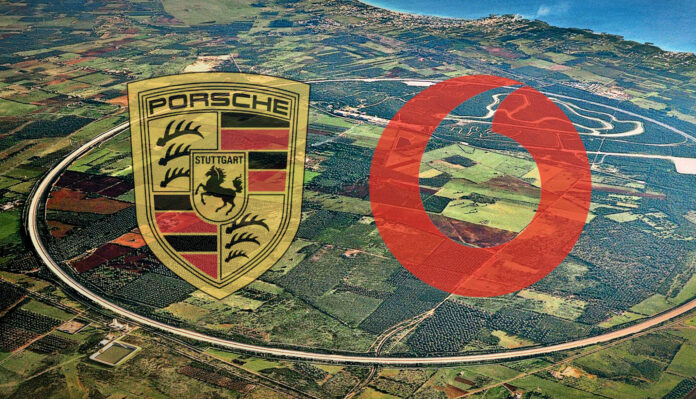Another private 5G story, and another which claims primacy and (apparently) unmatched scale. Vodafone Business, the enterprise division of UK operator Vodafone, has said it has built “Europe’s first hybrid private 5G network”, on a site covering 700 hectares. The hybrid definition, here, means a “private network [is] fully integrated into [the] public network”, it said, in order to provide both private and public LTE and 5G coverage at the same location.
The deployment is for automotive brand Porsche, owned by Volkswagen; specifically, it is for a Porsche proving ground, called the Nardò Technical Center (NTC), in the Apulian region of Southern Italy. The NTC site features “more than 20” tracks for testing vehicles; the whole site covers 700 hectares – which is no less than seven million square metres (at a conversion of 1:10,000), and would knock Nokia’s parallel announcement with ASN about “Europe’s biggest industrial private 5G network” into a cocked hat, if the comparison was fair.
But these are not quite apples-for-apples 5G installations. One is all-edge private, we are told, and the other is a half-and-half match, between some kind of private infrastructure and a public network (which Vodafone does not actually own in France). It is not clear either how much of the NTC site is covered by the private cellular part; presumably it is completely covered by both private and public elements. And the question has to be asked as well whether the 5G installation at the NTC site can be categorised as “industrial”, as the ASN project is claimed to be.
The NTC providing ground is used for development and validation of intelligent and connected vehicles of the global automotive industry – which suggests critical edge-systems and in-coming URLLC cellular features are of interest, as they are for industrial 5G projects. A statement said NTC will use the LTE/5G setup to vehicle-to-infrastructure, vehicle-to-vehicle, and highly-automated driving functions and fully-automated vehicles. Anyway; interesting to consider, perhaps.
For its part, Porsche Engineering, which runs the NTC site, is using the private 5G edge-part of the new infra-combo to offer automotive customers a “real-time communication network” – which “promises” reduced delays, wider bandwidth, improved security and reliability, and faster deployment times”. The public part, apparently brand new as well, is just for “the local population [to] benefit from the availability of the fast 5G public network”, it seems. Which, again, is a curious division of network usage to declare in a statement about a “hybrid” infrastructure.
Subscribe now to get the daily newsletter from RCR Wireless News
The point is, probably, that NTC can use the local public 5G expansion for non-critical download-heavy consumer-style applications, as well. It seems likely the ‘hybrid’ nature of the installation at the NTC site refers also to a shared core for the private-access network, supported by on-site RAN infrastructure. Vodafone said the work is part of a broader collaboration with Porsche Group, which acquired the NTC facility in 2012; the operator helped with a standalone 5G installation at a Porsche development centre in Weissach, in Germany, last year.
The NTC’s main 12.6-kilometre circular track was renovated in 2019, with fibre optic for “fast data transmission and for appropriate road signage to validate automated driving”. Porsche recruited Ericsson for one of its first private 5G networks, at a manufacturing production complex in Leipzig, in Germany, using an enterprise 5G licence from German regulator BNetzA in the 3.7-3.8 GHz ‘vertical’ spectrum band. There is no word on the vendor partner for the new NTC project.
Peter Schäfer, chief executive of Porsche Engineering, said: “We are committed to constantly push technologies to the next level—so our customers can successfully meet the increasing demands of future mobility. With the new 5G network, NTC offers its customers now an even better infrastructure to develop and test intelligent, autonomous, and connected vehicles.”
Vinod Kumar, chief executive at Vodafone Business, said: “Private 5G networks can act as a springboard for companies by enabling them to evolve the way they do business. In Nardò, [private 5G] enables a facility that resembles an actual smart city, with coverage that is seamless on and off campus for the next generation of applications that will transform transportation and mobility.”

